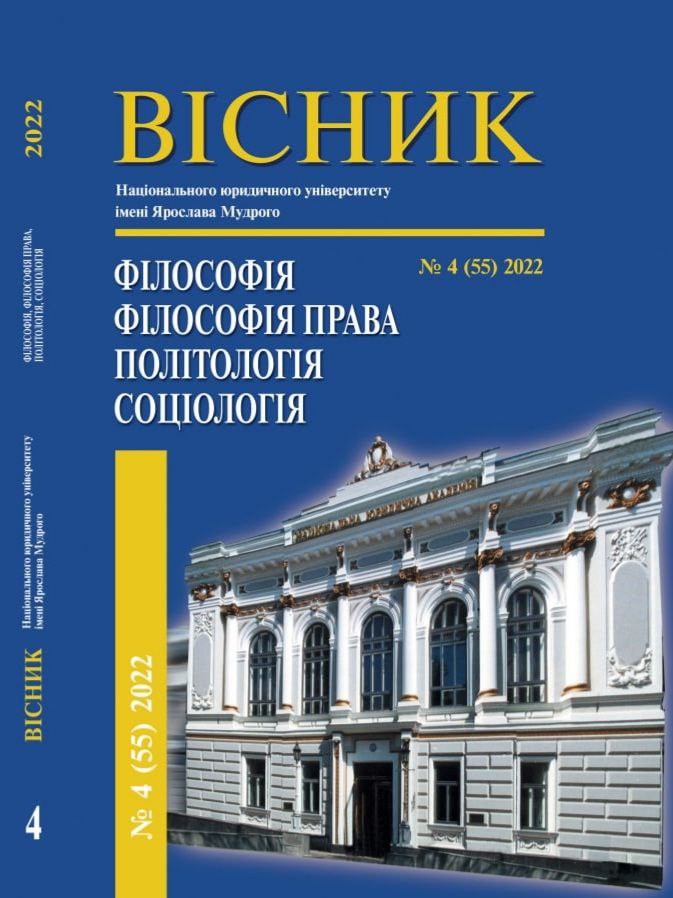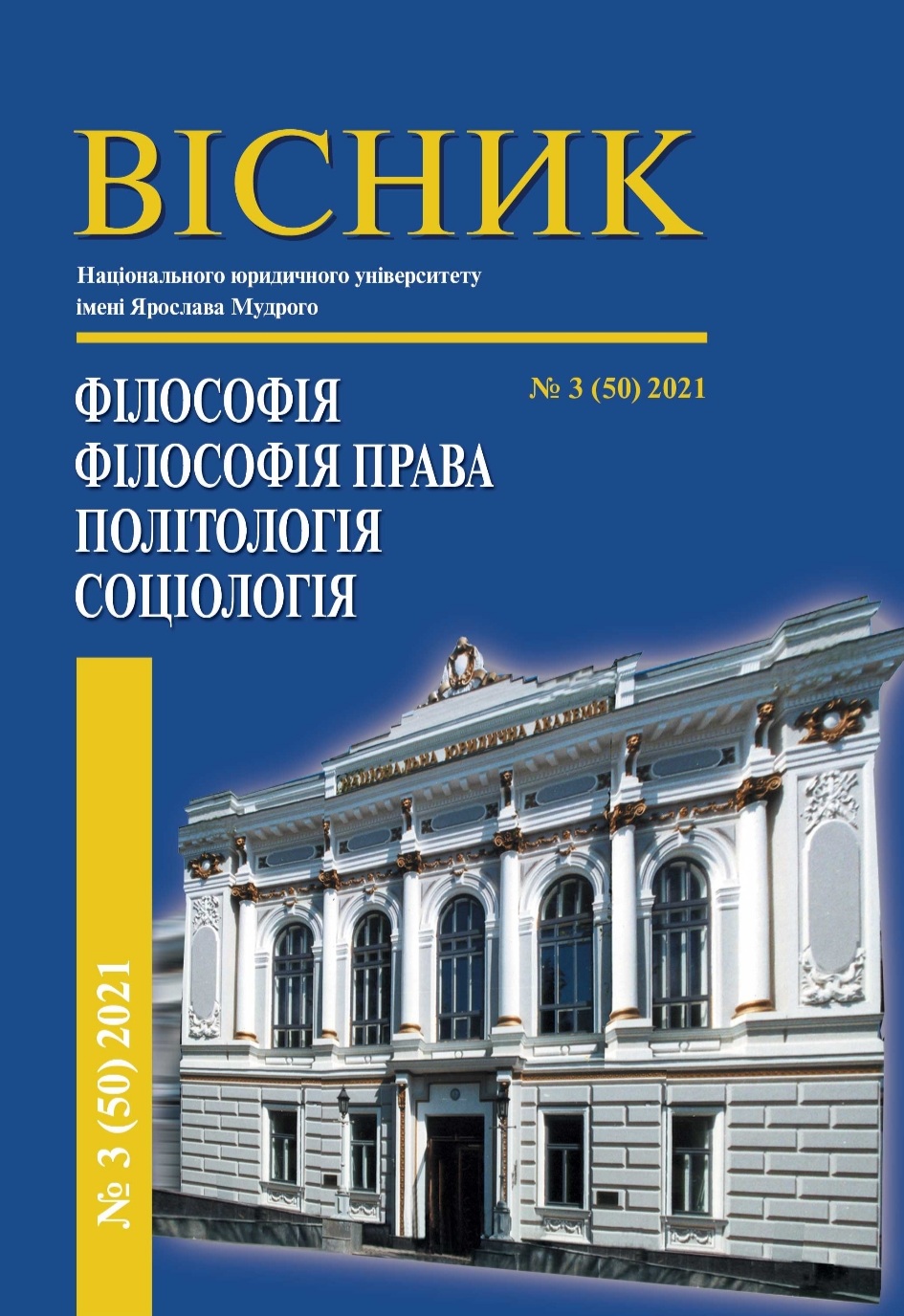ОСОБЛИВОСТІ СПІВІСНУВАННЯ ЛЮДИНИ ТА ДЕРЖАВИ У СФЕРІ КІБЕРБЕЗПЕКИ: ЄДНІСТЬ ЧИ ПРОТИЛЕЖНІСТЬ?
DOI:
https://doi.org/10.21564/2663-5704.55.268524Ключові слова:
кіберпростір, кібербезпека, кіберзлочинність, держава, людина, кіберсуверенітет, користувачАнотація
Публікацію присвячено з’ясуванню питання місця держави та громадянина-користувача у кіберпросторі. Розглядаються два протилежних підходи, кожний з яких базується на позиціях первинності держави або людини у питання кібербезпеки. Наводяться аргументи прихильників обох підходів і робиться висновок про ефективність їхньої діалектичної взаємодії з метою покращення ефективності кібербезпекових заходів.
Посилання
De Silva, J. (2022). Cyber security and the Leviathan. Computers & security. Vol. 116. URL: https://www.sciencedirect.com/science/article/pii/S0167404822000724?via%3Dihub.
Khari, M., Shrivastava, G., Gupta S., Gupta, R. (2017). Role of Cyber Security in Today's Scenario. Detecting and mitigating robotic cyber security risks. Hersey: Igi Global, 177–191.
Kovačević, A., Putnik, N., Tošković, O. (2020). Factors Related to Cyber Security Behavior. IEEE Acces, 8, 125140–125148.
Dutton, W. (2017). Fostering a cyber security mindset. Internet Policy Review, 6 (1). URL: https://policyreview.info/articles/analysis/fostering-cyber-security-mindset
Platsis, G. (2018). The Human Factor: Cyber Security's Greatest Challenge. International journal of public administration in the digital age, 5 (2), 23–39.
Ramirez, R., Choucri, N. (2016). Improving Interdisciplinary Communication With Standardized Cyber Security Terminology: A Literature Review. IEEE Access, 4, 2216–2243.
Purser, S. (2014). Standards for Cyber Security. Best practices in computer network defense: incident detection and response, 35, 97–106.
Wenhong, X. (2020). Challenges to cyber sovereignty and response measures. Mirovaya ekonomika i mezhdunarodnye otnosheniya, 64 (2), 89–99.
Fichtne, L. (2018). What kind of cyber security? Theorising cyber security and mapping approaches. Internet policy review, 7 (2). URL: https://policyreview.info/articles/analysis/what-kind-cyber-security-theorising-cyber-security-and-mapping-approaches.
Cavelty, M., Wenger, A. (2020). Cyber security meets security politics: Complex technology, fragmented politics, and networked science. Contemporary Security Policy, 41, 5–32.
Timur, F. (2017). The Rise of Cyber Diplomacy ASEAN’s Perspective in Cyber Security. KnE Social Sciences, 2 (4), 244–250.
Srinivas, J., Das, A., Kumar, N. (2019). Government regulations in cyber security: Framework, standards and recommendations. Future generation computer systems-the international journal of escience, 92, 178–188.
Orozco, P., Alejandro, G. (2021). Chinese and American cyber security models: a comparative. Oasis-observatorio de analisis de los sistemas internacionales, 34, 107–126.
Limnell, J., Lehto, M. (2019). The Importance of Strategic Leadership in Cyber Security: Case of Finland. 18th European Conference on Cyber Warfare and Security (ECCWS): proceedings of the 18th european conference on cyber warfare and security (ECCWS 2019). Coimbra, 288–296.
Tatar, U., Calik, O., Celik, M., Karabacak, B. A (2014). Comparative Analysis of the National Cyber Security Strategies of Leading Nations. 9th International Conference on Cyber Warfare and Security (ICCWS): proceedings of the 9th international conference on cyber warfare and security (ICCWS-2014). West Lafayette, 211–218.
Stitilis, D., Pakutinskas, P., Malinauskaite, I. (2017). EU and NATO cybersecurity strategies and national cyber security strategies: a comparative analysis. Security journal. 30 (4), 1151–1168.
Srinivas, J., Das, A., Kumar, N. (2019). Government regulations in cyber security: Framework, standards and recommendations. Future generation computer systems-the international journal of escience, 92, 178–188.
Corradini I., Nardelli E. (2019). Building Organizational Risk Culture in Cyber Security: The Role of Human Factors. 9th International Conference on Applied Human Factors and Ergonomics (AHFE-2018): proceeding of the 9th International Conference on Applied Human Factors and Ergonomics (AHFE-2018). Orlando, 782, 193–202.
Breda, F., Barbosa, H., Morais, T. (2017). Social engineering and cyber security. 11th International Conference on Technology, Education and Development (INTED-2017): proceedings of the 11th International Conference on Technology, Education and Development (INTED-2017). Valencia, 4204–4211.
Thakar, H., Joshi, R., Dobariya, A. (2019). An Analysis on Scope of Cyber Security. 6th International Conference on Computing for Sustainable Global Development (INDIACom-2019): proceedings of the 6th international conference on computing for sustainable global development (INDIACom-2019). New Delhi, 612–615.
Young, H., Van Vliet, T., Van de Ven, J., Jol, S., Broekman, C. (2018). Understanding Human Factors in Cyber Security as a Dynamic System. International Conference on Human Factors in Cybersecurity (AHFE-2018): proceedings of the International Conference on Human Factors in Cybersecurity (AHFE-2018). Los Angeles, 593, 244–254.
Guthikonda, A., Al-Shaer, E., Farooq, A., Raja, M. (2017). Bio-Inspired Innovations in Cyber Security. 14th IEEE International Conference on Smart Cities - Improving Quality of Life Using ICT and IoT (HONET-ICT-2017): proceedings of the 14th IEEE International Conference on Smart Cities - Improving Quality of Life Using ICT and IoT (HONET-ICT-2017). Irbid, 105–109.
Gratian, V., Bandi S., Cukier ,M., Dykstra, J., Ginther, A. (2018). Correlating human traits and cyber security behavior intentions. Computers & Security, 73, 345–358.
Moustafa, A., Bello, A., Maurushat, A. (2021). The Role of User Behaviour in Improving Cyber Security Management. Frontiers in Psychology. URL: https://www.frontiersin.org/articles/10.3389/fpsyg.2021.561011/full.
Chang, L., Zhong, L., Grabosky, P. (2018). Citizen co-production of cyber security: Self-help, vigilantes, and cybercrime. Regulation & Governance, 12 (1), 101–114.
Pitchan, M., Omar, S. (2019). Cyber Security Policy: Review on Netizen Awareness and Laws. Jurnal komunikasi-malaysian journal of communication, 35 (1), 103–119. URL: https://ejournal.ukm.my/mjc/article/view/30796
Van der Vyver, C., Mcdonald, P. (2018). Improving Cyber Security Awareness among Generation X. 32nd Conference of the International-Business-Information-Management-Association (IBIMA-2018): proceedings of the 32nd Conference of the International-Business-Information-Management-Association (IBIMA-2018). Seville, 170–181.
Barakovic, S., Husic, J. (2022). Cyber hygiene knowledge, awareness, and behavioral practices of university students. Information security journal, article 2088428. URL: https://www.tandfonline.com/doi/abs/10.1080/19393555.2022.2088428?journalCode=uiss20




